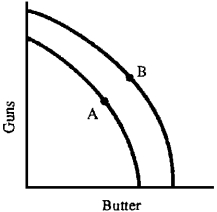Exam 3: The Fundamental Economic Problem: Scarcity and Choice
Exam 1: What Is Economics227 Questions
Exam 2: The Economy: Myth and Reality150 Questions
Exam 3: The Fundamental Economic Problem: Scarcity and Choice250 Questions
Exam 4: Supply and Demand: An Initial Look308 Questions
Exam 5: Consumer Choice: Individual and Market Demand202 Questions
Exam 6: Demand and Elasticity207 Questions
Exam 7: Production,Inputs,and Cost: Building Blocks for Supply Analysis215 Questions
Exam 8: Output,Price,and Profit: The Importance of Marginal Analysis189 Questions
Exam 9: Securities: Business Finance,and the Economy: The Tail That Wags the Dog198 Questions
Exam 10: The Firm and the Industry Under Perfect Competition206 Questions
Exam 11: Monopoly204 Questions
Exam 12: Between Competition and Monopoly225 Questions
Exam 13: Limiting Market Power: Regulation and Antitrust152 Questions
Exam 14: The Case for Free Markets I: the Price System219 Questions
Exam 15: The Shortcomings of Free Markets214 Questions
Exam 16: The Markets Prime Achievement: Innovation and Growth110 Questions
Exam 17: Externalities, the Environment, and Natural Resources217 Questions
Exam 18: Taxation and Resource Allocation219 Questions
Exam 19: Pricing the Factors of Production228 Questions
Exam 20: Labor and Entrepreneurship: The Human Inputs222 Questions
Exam 21: Poverty, Inequality, and Discrimination167 Questions
Exam 22: International Trade and Comparative Advantage226 Questions
Select questions type
Table 3-1
Peanuts (Bushels) Corn (Bushels) 0 55 10 50 20 42 30 28 40 0
-Suppose a farmer produces 50 bushels of corn and 10 bushels of peanuts.According to Table 3-1,the opportunity cost of 10 more bushels of peanuts is
Free
(Multiple Choice)
4.8/5  (32)
(32)
Correct Answer:
A
The idea of opportunity cost is relevant
Free
(Multiple Choice)
4.9/5  (33)
(33)
Correct Answer:
D
Economics is often described as a science of constrained choice.How do you justify this argument?
Free
(Essay)
4.8/5  (38)
(38)
Correct Answer:
Economics deals with the allocation of limited resources to satisfy unlimited human wants.We need resources such as labor,capital,raw material etc,to produce goods and services to satisfy man's unlimited needs.These resources are not only scarce but they have more than one use.The scarcity of resources means humans are constrained in the choices they make about the goods and services they produce,and thus also about which wants they will ultimately satisfy.
Figure 3-3
 -In Figure 3-3,a shift from A to B seems most consistent with which of the following?
-In Figure 3-3,a shift from A to B seems most consistent with which of the following?
(Multiple Choice)
4.9/5  (30)
(30)
Firms are encouraged by the profit motive to use inputs efficiently.
(True/False)
4.9/5  (35)
(35)
Economists use the term capital to describe that factor of production that includes human-made resources such as factories,buildings,machinery and tools.
(True/False)
4.8/5  (40)
(40)
The production possibilities frontier has a tendency to bow outward from the origin.
(True/False)
4.8/5  (31)
(31)
For a given production possibilities frontier,which points are attainable?
(Multiple Choice)
4.8/5  (34)
(34)
The fact that resources tend to be specialized is one reason the production possibilities frontier is drawn
(Multiple Choice)
4.7/5  (36)
(36)
Society can produce at a point outside the production possibilities frontier,but only if it is using all of its resources efficiently.
(True/False)
4.9/5  (38)
(38)
The production possibilities curve illustrates the basic principle that
(Multiple Choice)
4.9/5  (39)
(39)
The divergence between money costs and opportunity costs is the least in which of the following situations?
(Multiple Choice)
4.8/5  (39)
(39)
If the U.S.government decides to increase military spending,one opportunity cost will be lower spending on education.
(True/False)
4.8/5  (38)
(38)
"OPEC is exploiting the United States by selling us oil at inflated prices." Agree or disagree.
(Essay)
4.8/5  (36)
(36)
Although finished goods are scarce,the inputs to produce them are not scarce.
(True/False)
4.9/5  (34)
(34)
Because resources tend to be specialized,increased production of military goods tends to
(Multiple Choice)
4.9/5  (37)
(37)
Showing 1 - 20 of 250
Filters
- Essay(0)
- Multiple Choice(0)
- Short Answer(0)
- True False(0)
- Matching(0)